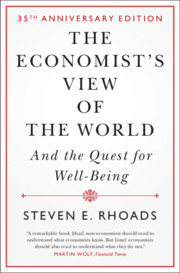Book contents
- More Praise for The Economist’s View of the World
- The Economist’s View of the World
- The Economist’s View of the World
- Copyright page
- Dedication
- Contents
- Preface
- Acknowledgments to the First Edition
- Acknowledgments
- Introduction
- Part I Useful Concepts
- 1 Opportunity Cost
- 2 Marginalism
- 3 Economic Incentives
- Part II Government and Markets, Efficiency and Equity
- Part III The Limits of Economics
- Notes
- Index
1 - Opportunity Cost
from Part I - Useful Concepts
Published online by Cambridge University Press: 24 September 2021
- More Praise for The Economist’s View of the World
- The Economist’s View of the World
- The Economist’s View of the World
- Copyright page
- Dedication
- Contents
- Preface
- Acknowledgments to the First Edition
- Acknowledgments
- Introduction
- Part I Useful Concepts
- 1 Opportunity Cost
- 2 Marginalism
- 3 Economic Incentives
- Part II Government and Markets, Efficiency and Equity
- Part III The Limits of Economics
- Notes
- Index
Summary
Dedicated public policy professionals are focused on improving their programs. Understandably, they neglect other worthy goals. Economists insist on focusing on the big picture: the opportunity costs for other departments and for taxpayers of spending more and more to address a single problem.
Economists find themselves at odds with experts, who singlemindedly pursue worthy ends without regard to costs. Consider megaprojects such as supersonic transport airplanes and high-speed trains. The engineers who design them want to show what they can do with “adequate” funding. Politicians want to be credited with spearheading such megaprojects. Economists, by contrast, want to be sure that consideration is given to less glamorous projects that may bring greater benefits at far less expense.
Opportunity costs are especially neglected when it comes to saving lives. It’s an easy applause line: “We should pay any price to save a life.” But some projects will reduce very small risks at a cost of hundreds of millions of dollars. Economists remind us that we all take very small risks in our daily living, and there are many programs that will reduce risk. We can’t “fully fund” them all without neglecting, for example, our education and environmental goals.
- Type
- Chapter
- Information
- The Economist's View of the WorldAnd the Quest for Well-Being, pp. 9 - 27Publisher: Cambridge University PressPrint publication year: 2021

